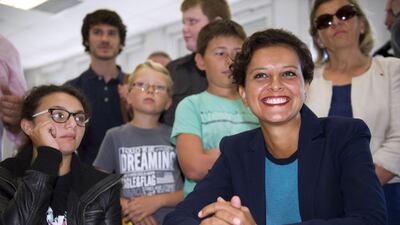As summer crowds begin their retreat from French beaches, the country with Europe’s largest Muslim and Jewish populations is preparing for an academic year that promises compulsory new lessons on secular morality and continuing controversy over substitutes for pork in school canteens.
These two features of this year's rentrée, as the return to school is known, are indirectly linked. Traditional French society, and politicians of most shades of opinion, deeply value the principle of laïcité which enshrines the separation of religion and state in a law passed in 1905.
Local councils now insisting that pupils should be offered no alternative when pork is on the menu cite this precious tenet as justification for the decision.
Gilles Platret, the centre-right mayor of the Burgundy town of Chalon-sur-Saône, hailed a court ruling this month in favour of his stance as a "first victory for laïcité".
The battle is not over. France’s education minister, Najat Vallaud-Belkacem, a builder’s daughter born in the Rif region of Morocco, says the policy amounts to “taking children hostage”. Indeed, it is difficult to see what is to be gained, in a country that trumpets the virtues of liberty and fraternity as well as equality, in denying selected children access to school meals containing meat when their faith requires them to refuse pork.
Perhaps a more commendable lesson in laïcité has been delivered not by point-scoring politicians with an eye on the anti-Islam vote, but by a doughty group of Muslim mothers in the attractive southern city of Montpellier.
These women, most sharing the minister’s Moroccan origins, are campaigning for an end to the “social apartheid” that ensures their children sit in classes only with pupils who are also the products of immigration.
As was compellingly argued by one of the mothers, giving only her first name Safia, these parents yearn for class photographs showing white as well as black or olive skins, fair-haired children next to those with birthplaces or roots in the Maghreb or Sub Saharan Africa.
Having listened for years to lectures about the need for Muslims to integrate more enthusiastically in French society, they are demanding just that. The principle is called la mixité, a term previously applied to boys and girls being educated in mixed classes, and the women have staged marches and school occupations in support of their cause, as well as bombarding national and city officials and political leaders with letters and emails.
There has been only limited progress in ending what they call the “sad reality” of the deprived Petit Bard quarter of Montpellier, the very “territorial social and ethnic apartheid” that France’s socialist prime minister Manuel Valls has also, in more general terms, decried. Ms Vallaud-Belkacem has been silent on the matter, her spokeswoman saying merely that the position of city education officials reflects her own.
That local response is to suggest some sympathy for the mothers’ case while explaining that established policies on school catchment areas necessarily mean that if one ethnic community dominates an area, it is also likely to dominate the intake at local schools. Petit Bard, once home to a rich ethnic variety, is now overwhelmingly Moroccan.
An unintended consequence of the so-called “secorisation” of schooling is to add to the burden of families in such districts at Petit Bard, already suffering the social segregation deplored by Mr Valls. They also experience unfavourable socioeconomic conditions, unemployment at a rate five times higher than the rest of the city, a lack of play areas and are expected to accept that their children will meet only those of their own social and ethnic origin from nursery to high school.
Put simply, the campaigners seek a respectful educational environment so their children are able to encounter other cultures and backgrounds “and become, in short, citizens of the French Republic”.
It is tempting to suggest the issue would make an excellent first topic for one of the new lessons on secular morality.
Colin Randall is a former executive editor of The National


